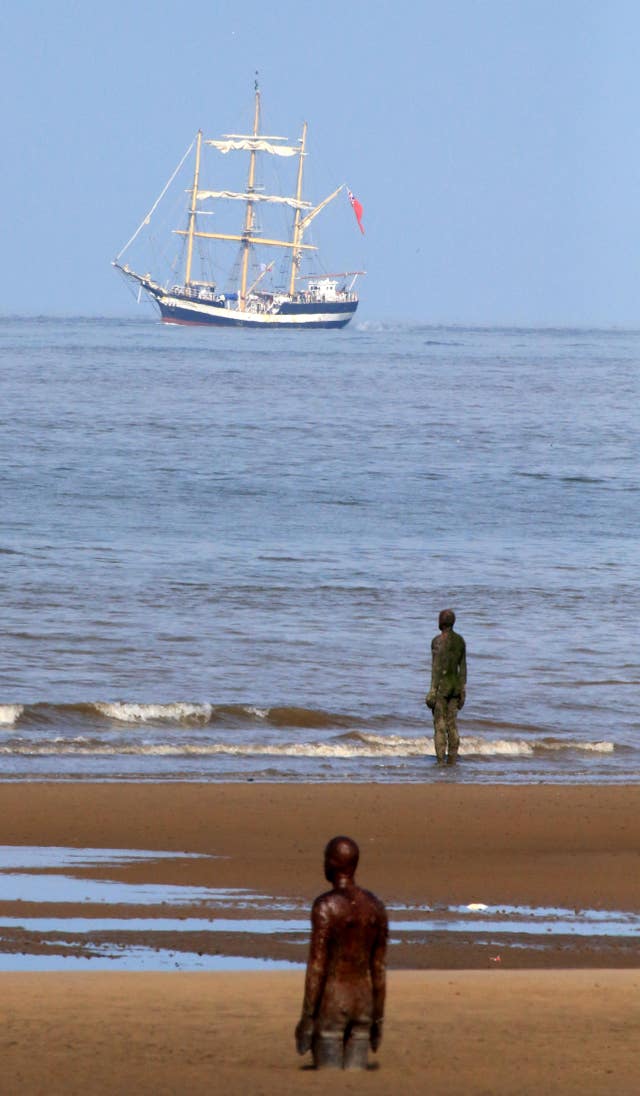Teenager drowned after being swept out to sea on beach, inquest hears
Daniel Halliday, 14, had been jumping waves with friends on Crosby Beach in Merseyside.

A teenager drowned after he was swept out to sea while jumping waves with friends on a beach, an inquest has heard.
Daniel Halliday, 14, was with two others at Crosby Beach in Sefton, Merseyside, when he was swept out to sea on June 30 last year, an inquest at Bootle Town Hall heard on Thursday.
The body of the teenager, from Tuebrook, Liverpool, was discovered by an RNLI crew off the coast at New Brighton, Wirral, on July 8.
Senior coroner Julie Goulding ruled his death, from drowning, was an accident.
She said: “Tragically, the catastrophic accident unfolded when three young people were out having fun together and enjoying themselves.”
One of the youngsters with Daniel on the day said they were jumping waves, taking photos and having a “really good time” at the beach, famous for Antony Gormley’s Another Place installation which is made up of 100 cast iron sculptures.
In a statement read to the court, the boy, who cannot be named for legal reasons, said the waves seemed to get bigger and their other friend was struggling so he got out of the water with her and shouted to Daniel to get on his back.
He said he threw a life-ring to Daniel but the rope was not long enough to reach him.
He said: “I was screaming and shouting because I was getting nowhere.”
The boy added: “There was no lifeguard or coastguard during our time on the beach and no one told us not to go into the water.
“At no point did we know the water at Crosby Beach was dangerous to enter.”
Detective Inspector Paul McVeigh told the inquest CCTV showed three youngsters swimming in the sea just after 6.30pm before one of them was swept away.
He said: “Daniel can be seen disappearing off camera towards Liverpool with his head still above the water.”

Lifeboats, the police helicopter, the coastguard and fire and ambulance crews were involved in the search for the teenager, which was called off at 1am the following morning but resumed at first light.
The operation was handed over from HM Coastguard to Merseyside Police at about 10.30am when a decision was made to stop searching, the inquest was told.
David Moore, a staff officer for the coastguard, said the water temperature meant Daniel had a possibility of surviving for 22 hours at most.
But, he said the search was called off before then because of how thorough the efforts to find him had been.
He said: “If Daniel was on the surface of the water through that time we would have most likely seen him.”
The beach is the only one in the country which is staffed by a lifeguard every day of the year, the inquest heard, but they were on the beach from 10am to 6pm so were not on duty when Daniel got into difficulty.
Michael Buratti, area commander for HM Coastguard, said Crosby was a “relatively dangerous beach” because areas could be cut off by tides, there was sinking mud and it was close to a busy shipping channel in and out of the River Mersey which could create waves.
Michelle Williams, from Sefton Metropolitan Borough Council, said the life ring used to try to rescue Daniel was not put in place by the council, but was likely to have been put there by a “well meaning member of the public”.
The inquest heard it would not have been effective for rescuing someone in that area.
Ms Williams said there were 35 signs along the 3.4km stretch of beach which advised that it was not a bathing beach and warned of the dangers.
Daniel’s family told the inquest signs had been faded when they visited the area.
His mother Paula Heaton said: “They were all dull and all washed out, they’re not going to attract a child’s eye.”
The coroner said it was a “positive step” that there were plans by the council to put more, larger signs in place.





